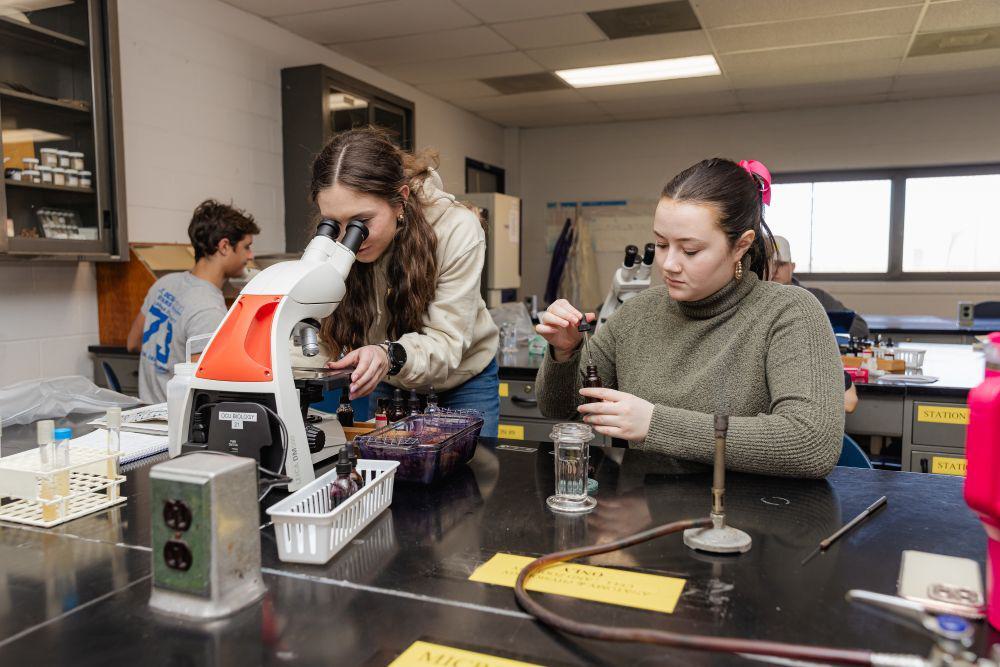Changes help align with in-demand post-baccalaureate careers
ÃÛÌÒÓ°ÏñAV’s Petree College of Arts & Sciences has overhauled some of its biology degree programs, introducing two distinct, post-baccalaureate-focused tracks designed to better prepare students for the competitive landscape of medical, dental and allied health professions.
Led by Dr. Nikki Seagraves, chair of the Biology Department, these changes reflect a strategic effort to enhance curriculum, streamline pathways and solidify ÃÛÌÒÓ°ÏñAV’s commitment to student success in high-demand fields.
"Our goal was to create clear, direct pathways for our students based on their post-graduation aspirations," Seagraves said. "By introducing these specialized tracks, we're providing greater clarity and ensuring our curriculum directly supports students aiming for medical school, dental school, physician assistant programs, physical therapy and other vital healthcare professions."
Targeted pathways for future health professionals
The newly structured Bachelor of Science in Biology now offers three distinct tracks:
- Pre-Medicine (Pre-Med/Pre-Dent/Pre-Grad)
- Allied Health
- General Biology
The Pre-Medicine track is specifically designed for students pursuing rigorous graduate and professional programs, building upon the strengths of the former B.S. in Cell and Molecular Biology. The Pre-Allied Health track, replacing the B.S. in Biomedical Science, provides a robust foundation for those entering fields such as physician assistant, physical therapy and occupational therapy.
Enhanced curriculum and faculty expertise
These significant changes include:
- Expanded introductory biology: The former condensed one-semester introductory biology course was expanded into a two-semester sequence: Introduction to Biology: Ecology, Evolution & Diversity and Introduction to Biology: Molecules, Cells & Physiology. This allows for a more thorough exploration of foundational concepts, keeping students engaged and better prepared for advanced coursework.
- Dedicated human anatomy and physiology courses: The previous Anatomy & Physiology courses with lab have been separated into Human Anatomy and Human Physiology, allowing for deeper focus on structure and function, a change supported by the Kramer School of Nursing.
- Curriculum refinement: Several outdated or low-demand courses were removed, and prerequisites for core courses like Genetics and Microbiology were updated to align with the new introductory sequence. Moving forward, the department will prioritize offering upper-division electives with a biomedical focus to better prepare students for careers and graduate programs in the health sciences.
- Faculty updates: The department has bolstered its expertise in recent years with the addition of Dr. Christina Hendrickson (Ph.D. in Clinical Laboratory Sciences), Dr. Lindsey Morris (Ph.D. in Cellular Regulation), and Jana Green as lab tech and biology instructor (M.S. in Natural Sciences). Dr. Seagraves, with her Ph.D. in Biomedical Sciences, was appointed department chair in Fall 2024, bringing a strong biomedical focus to the department.
- Updated equipment: Recent donations have been utilized to acquire and update equipment, supporting the enhanced curriculum and providing students with modern learning tools.
Student-centric approach
ÃÛÌÒÓ°ÏñAV Biology remains committed to a student-centric approach, offering small class sizes, faculty advising for all undergraduate biology majors and opportunities for undergraduate research. Historically, over 90% of ÃÛÌÒÓ°ÏñAV Biology students have been accepted into their preferred graduate or professional programs, a testament to the department's dedication to career preparation.
"Our students are at the heart of everything we do," Seagraves noted. "These revisions will not only clarify degree pathways but also provide a more comprehensive and contemporary education, ensuring our graduates are exceptionally well-prepared for their post-baccalaureate endeavors and successful careers in the life and health sciences."
The general Biology track continues to offer a comprehensive grounding in biological sciences, preparing students for diverse paths including graduate studies, veterinary medicine, conservation and wildlife management. The B.S. in Biology Education has retained its name to maintain consistency within the university's education programs.
Prospective students are encouraged to consult with an ÃÛÌÒÓ°ÏñAV admissions counselor to determine the best major and track based on their individual goals and future plans.

